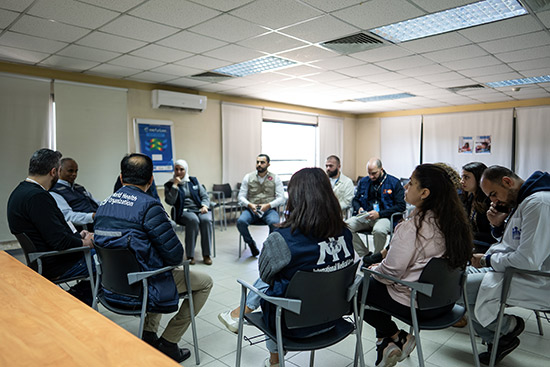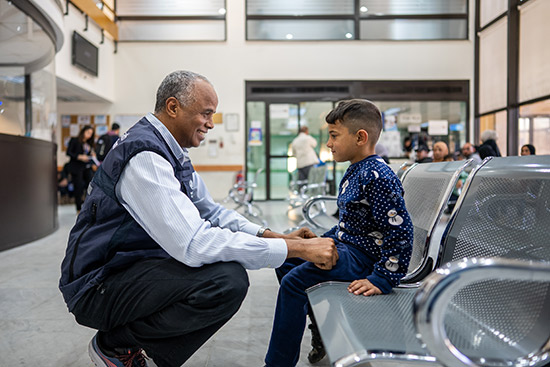
12 March 2025, Beirut, Lebanon – On its recent mission to the Bekaa, Baalbek/Hermel region, the Health Sector Coordination Team was joined by WHO Representative in Lebanon Dr Abubakar Abdinasir.
A key focus of the visit was the evolving security situation along the border and the influx of people crossing into Lebanese territory. This new dynamic urgently requires a well-coordinated health response to ensure that essential medical services reach those in need.
The mission’s primary objective was to analyze the situation closely, especially the operational challenges faced by humanitarian service providers in the Bekaa. Through the visit, the Team was able to gain crucial insights into service delivery, resource constraints and the needs of health care workers and vulnerable beneficiaries.
The most recent conflict has had a significant impact on health facilities in the area. The Team assessed existing health care provision and strategized ways to enhance service quality and accessibility. It visited the Nafela Primary Health Care Centre (PHCC) and the Taanayel PHCC as part of a broader strategy to maintain close engagement with partners and subnational colleagues and ensure that national coordination efforts are responsive to realities on the ground.
The Team’s findings will inform advocacy efforts for urgently needed support and funding.
In addition to immediate health care concerns, the Team examined the ways in which the global humanitarian financing landscape is affecting health care initiatives. Engagement with partners shed light on how they are coping with financial constraints and, in collaboration with the Ministry of Public Health, explored possible solutions.
Discussions during the mission extended beyond NGO partners to include both local organizations managing health facilities and patients. Understanding patient perspectives is essential given that funding cuts could result in higher out-of-pocket expenses for essential health services.
By discussing priorities, identifying gaps and examining the feasibility of alternative funding solutions, the Team aims to develop actionable strategies. These efforts will help manage limited resources effectively and create contingency plans to sustain health care services under challenging conditions. The goal is to align national-level strategies with on-the-ground realities, ensuring that health care delivery remains efficient and impactful.

The mission followed the Health Sector Partner Retreat held in January, during which partners expressed appreciation for the Team’s presence in the field and the ways in which it facilitates greater coordination and boosts morale among frontline health care workers.
“Recognition and acknowledgment can go a long way in motivating the health care workforce, demonstrating that their efforts are recognized and valued,” said Health Sector Coordinator Dr Shajib Hossain.
The Health Sector Coordination Team is committed to advocating for necessary resources and technical and policy support which is best achieved by maintaining direct engagement with local stakeholders and continuously evaluating the evolving situation.
“Our goal is to strengthen Lebanon’s health care response in close collaboration with the Ministry of Public Health, ensuring that the most vulnerable populations receive the care they need,” concluded Dr Hossain.







